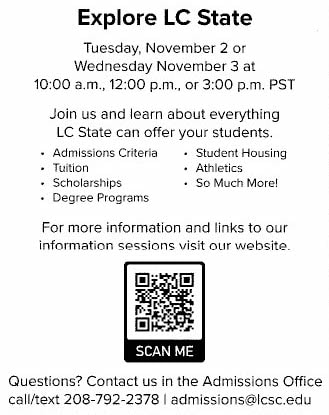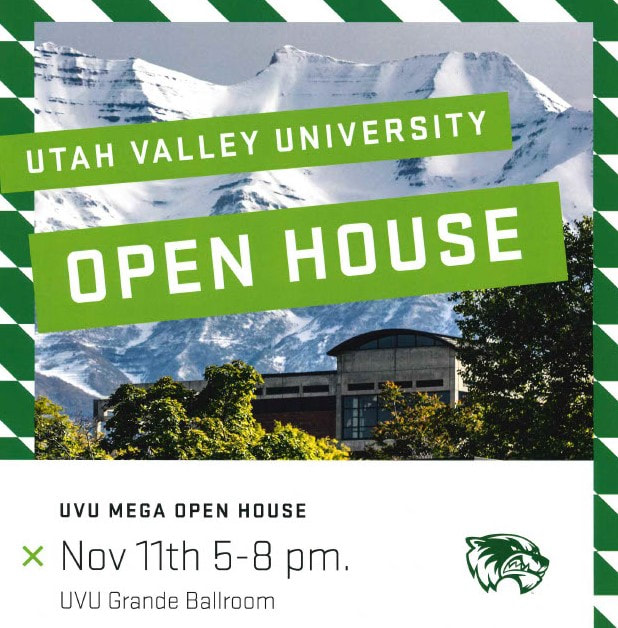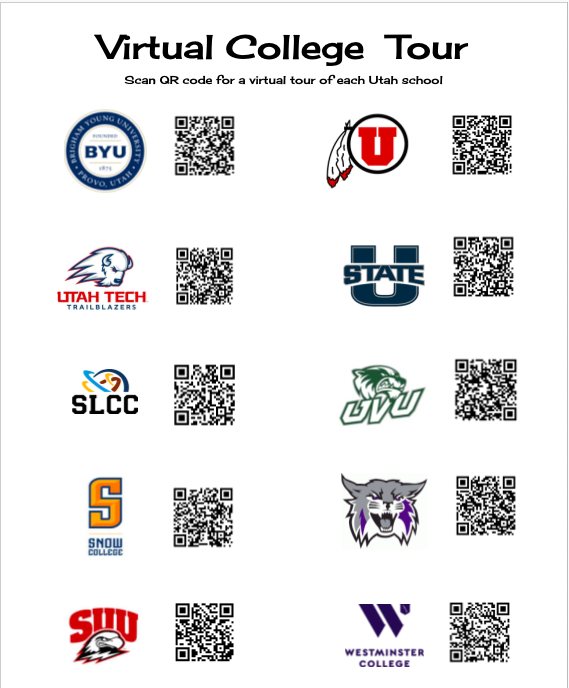In-Person & Virtual Tours, Open Houses, and Events at Utah Colleges

|
UACRAO (Utah Association of Collegiate Registrars and Admission Officers) put together College and University tours page specifically for High School students. Click here to visit the page and view the videos.
Here are some other virtual tours/presentations that can give students and authentic feel for the campus. Click on the links below to access the virtual tours.
University of Utah Utah Tech University
Utah State University Utah Vally University
BYU Westminster College
Weber State Salt Lake Community College: Recorded Tour | Live Virtual Tours
Southern Utah University Snow College
University of Utah Utah Tech University
Utah State University Utah Vally University
BYU Westminster College
Weber State Salt Lake Community College: Recorded Tour | Live Virtual Tours
Southern Utah University Snow College
Visit A Campus
Below are some of the current college events that we are aware of. We are updating this page through-out the year. If you are interested in a particular college, please check their site to up-to-date information.

Utah State University is inviting you to visit their campus during True Blue Days. This is your opportunity to be the cool kid on campus. For one day, you will be an Aggie, hang out with friends, and tour the campus. Register for one of their True Blue Days today to find out what the Aggie life is all about.

Snow College Overnight SnowBlast - experience campus life before starting college.
High School Juniors and Seniors have the opportunity to stay with a Snow College Ambassador and see what it’s really like to be a Snow College student. For only $30, the SnowBlast overnight visit includes the following: Tour of campus, Meals (Dinner on Friday/Breakfast on Saturday), Overnight accommodations with a Snow College Ambassador, Attend a Snow College event, Information sessio, On-campus housing tour, Exclusive Snow College t-shirt. For more information, click here.
High School Juniors and Seniors have the opportunity to stay with a Snow College Ambassador and see what it’s really like to be a Snow College student. For only $30, the SnowBlast overnight visit includes the following: Tour of campus, Meals (Dinner on Friday/Breakfast on Saturday), Overnight accommodations with a Snow College Ambassador, Attend a Snow College event, Information sessio, On-campus housing tour, Exclusive Snow College t-shirt. For more information, click here.

Southern Utah University (SUU) Red Riot days is a great way for any high school student to experience the university as they spend the weekend with one of our student Ambassadors!
For only $25, each Red Riot Overnight includes the following:
Tour of campus; Meals (Friday evening & Saturday morning); Overnight accommodations; Tickets to SUU events; Information about classes; T-shirt to remember the event; Scholarship advising and much more! To get more information or to register, please click here.
For only $25, each Red Riot Overnight includes the following:
Tour of campus; Meals (Friday evening & Saturday morning); Overnight accommodations; Tickets to SUU events; Information about classes; T-shirt to remember the event; Scholarship advising and much more! To get more information or to register, please click here.

Tour University of Utah
You and your family are invited to experience the University of Utah in person and discover the many opportunities available to you, and to get a feel for their amazing campus! During the academic year, they offer campus tours five days a week and select Saturdays. Please note that the availability of their tours are subject to change. For more information, please visit their website.
You and your family are invited to experience the University of Utah in person and discover the many opportunities available to you, and to get a feel for their amazing campus! During the academic year, they offer campus tours five days a week and select Saturdays. Please note that the availability of their tours are subject to change. For more information, please visit their website.

Tour Utah Valley University Campus
Come see for yourself how Utah Valley University's unique indoor campus makes engaged learning possible!
Campus tours are offered of the main Orem campus Mondays at 10am, Tuesdays at 3pm and Wednesdays at 10am. For up to date information, please visit their website.
Come see for yourself how Utah Valley University's unique indoor campus makes engaged learning possible!
Campus tours are offered of the main Orem campus Mondays at 10am, Tuesdays at 3pm and Wednesdays at 10am. For up to date information, please visit their website.

Grand Canyon University is on track to host our all expenses paid fly-in trips starting in October in addition to travel reimbursement opportunities for students and their parents. Click here for Zoom Information Session on September 1 2021 flier. We are not only encouraging college visits, but making them equitable and attainable. We have the privilege of working one on one with each interested student, applicant, and their parents and are here to be a resource to YOU.
Tips for Your College Tours
Most colleges offer campus tours and information sessions. You can learn a lot from them—if you are an active participant.
Taking the campus tour is a rite of passage for college applicants. Once you've done a few tours, you may be tempted to skip them. But don't. Tours are great vehicles for getting a student-led introduction to the college.
What You'll See on a Campus Tour
You will see campus highlights such as the dorms, classrooms, libraries, museums, the student store, the stadium, the gym, the theater, and the student union. A current student usually leads the tour and answers questions. Tours typically take one to two hours.
What You'll Learn from an Information Session
An information session may be part of your tour, or offered separately. It presents a basic overview of the admissions process and financial aid, academic programs, and undergraduate life. This may answer many of your questions. Sessions typically take about an hour.
What to Look for on a Campus Tour
The tour will show you many of the places students frequent most. So try to picture yourself in each setting you visit. Keep an eye out for the following:
What to Ask the Tour Guide
A tour gives you a golden opportunity to ask questions of an actual student. Avoid questions that can be answered on the college's website or in its view book. Here are some examples:
Tips for Campus Tours
Taking the campus tour is a rite of passage for college applicants. Once you've done a few tours, you may be tempted to skip them. But don't. Tours are great vehicles for getting a student-led introduction to the college.
What You'll See on a Campus Tour
You will see campus highlights such as the dorms, classrooms, libraries, museums, the student store, the stadium, the gym, the theater, and the student union. A current student usually leads the tour and answers questions. Tours typically take one to two hours.
What You'll Learn from an Information Session
An information session may be part of your tour, or offered separately. It presents a basic overview of the admissions process and financial aid, academic programs, and undergraduate life. This may answer many of your questions. Sessions typically take about an hour.
What to Look for on a Campus Tour
The tour will show you many of the places students frequent most. So try to picture yourself in each setting you visit. Keep an eye out for the following:
- What's life like for freshmen? Be sure to go inside a dorm room and visit the main library. How would you feel hanging out in those places?
- What's going on? Notice what most students are doing. Rushing to class, relaxing on lawns, chatting with friends? How do you fit in?
- What's the feel of the campus? Park-like, urban and noisy, intimate and cozy, or...? Can you see yourself feeling happy and engaged here?
What to Ask the Tour Guide
A tour gives you a golden opportunity to ask questions of an actual student. Avoid questions that can be answered on the college's website or in its view book. Here are some examples:
- What do you love about this college?
- What does the college do to help freshmen adjust and meet people?
- What do students do to socialize on campus?
- What's the nearest town like?
- What student safety precautions are in place?
- What would you like to see changed about this college?
Tips for Campus Tours
- Plan ahead. You can get a schedule on the school's website or via a recorded phone message. Download a campus map so you can easily find where the tour starts.
- Allow plenty of time. That way you can ask your questions and absorb what you see.
- Take notes and photos. Your memory of the tour will fade quickly—and your notes and photos will help you compare colleges.
- Explore outside the campus. Find out how you feel about the nearest town
Visit a College Without Stepping on Campus
Visiting a college before you decide to apply is always a good idea. But in reality, it's often not possible. Fortunately, you have many avenues for investigating a college without leaving home.
Visit college websites. From links to YouTube channels to dorm photos to the cafeteria menu, every college website is full of information that brings the college to life. Useful sections include college news, academic departments, student life, and of course, admissions and financial aid. See Mining for Gold on College Websites for more tips.
Take virtual tours. Many colleges offer virtual campus tours on their website and via apps you can download to your phone. These can guide you through the campus and provide lots of visuals. They may also include information such as admissions requirements and deadlines.
Look at student newspapers. Most colleges have one or more newspapers written by and for students. You will usually find them on the college's website. These will give you an idea of what students consider important, how they like to have fun, and what sort of informal activities are going on.
Talk to college representatives. Ask your counselor or visit college websites to find out how to contact local admissions reps for colleges you are interested in. They can answer your questions and help you better understand whether you are a good fit to the college. Many reps do presentations at high schools. Don't hesitate to introduce yourself.
Attend college fairs. Colleges also send reps to college fairs to meet students and parents and introduce them to their college. If you prepare your questions in advance, you can find out a great deal about specific colleges in just a few hours. See Why Attend College Fairs? to learn how to have a productive experience.
Welcome college mailings. Want to receive information about a college by mail or e-mail? You can sign up for its mailing list in seconds in the admissions section of the college's website. Every time you receive material, scan it for new information and visuals of the college.
Connect with college students. From YouTube to Twitter to Facebook, college students have many ways to sound off about their college. These comments will give you a feel for what some students think of a college—and what sort of people go there. Also ask friends, teachers, and parents for leads to college students you can talk to in person.
Arrange for local interviews. Contact the college admissions office to find out if you can interview a local alumnus, a current student home on break, or if possible, a college representative. See Get the Most from Your College Interviews.
Be careful with comments from classmates. When your friends offer opinions about colleges or your chances of getting in, your caution lights should start blinking. First, they don't know what will make a college right for you—that's for you to discover. Second, they have yet to experience what it's like to attend any college. So do your own research.
Visit college websites. From links to YouTube channels to dorm photos to the cafeteria menu, every college website is full of information that brings the college to life. Useful sections include college news, academic departments, student life, and of course, admissions and financial aid. See Mining for Gold on College Websites for more tips.
Take virtual tours. Many colleges offer virtual campus tours on their website and via apps you can download to your phone. These can guide you through the campus and provide lots of visuals. They may also include information such as admissions requirements and deadlines.
Look at student newspapers. Most colleges have one or more newspapers written by and for students. You will usually find them on the college's website. These will give you an idea of what students consider important, how they like to have fun, and what sort of informal activities are going on.
Talk to college representatives. Ask your counselor or visit college websites to find out how to contact local admissions reps for colleges you are interested in. They can answer your questions and help you better understand whether you are a good fit to the college. Many reps do presentations at high schools. Don't hesitate to introduce yourself.
Attend college fairs. Colleges also send reps to college fairs to meet students and parents and introduce them to their college. If you prepare your questions in advance, you can find out a great deal about specific colleges in just a few hours. See Why Attend College Fairs? to learn how to have a productive experience.
Welcome college mailings. Want to receive information about a college by mail or e-mail? You can sign up for its mailing list in seconds in the admissions section of the college's website. Every time you receive material, scan it for new information and visuals of the college.
Connect with college students. From YouTube to Twitter to Facebook, college students have many ways to sound off about their college. These comments will give you a feel for what some students think of a college—and what sort of people go there. Also ask friends, teachers, and parents for leads to college students you can talk to in person.
Arrange for local interviews. Contact the college admissions office to find out if you can interview a local alumnus, a current student home on break, or if possible, a college representative. See Get the Most from Your College Interviews.
Be careful with comments from classmates. When your friends offer opinions about colleges or your chances of getting in, your caution lights should start blinking. First, they don't know what will make a college right for you—that's for you to discover. Second, they have yet to experience what it's like to attend any college. So do your own research.





